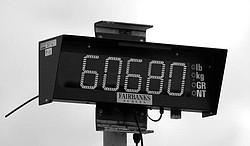Applying scales of justice to business
TIPPING THE SCALE: The electronic readout at Snyder Farms in Springfield Township
Deputy sealer protects public from errors, fraud
By PETER H. MILLIKEN
VINDICATOR STAFF WRITER
NEW SPRINGFIELD — Martin A. Cegan verifies the accuracy of Mahoning County’s commercial scales, large and small, to ensure that nobody gets cheated.
Cegan, the county’s deputy sealer of weights and measures, checks all of the known commercial scales, from the tiniest jeweler’s scale to the largest grain-elevator-truck-weighing scale.
For the smaller scales, he carries in his vehicle known weights ranging from 1/1,000th of a pound to 50 pounds.
For the large truck-weighing scales, such as those of landfills, scrap and slag yards, coal companies and grain elevators, he works with Paul Cawood, an Ohio Department of Agriculture weights and measures inspector, who drives a truck full of heavy test weights.
“You want to make sure the consumer is getting what they’re paying for. Anywhere from a truck scale to a grocery-store scale, it basically follows down the line,” Cegan said. “If something’s wrong here at the beginning, it can multiply and be even worse at the end” for the consumer, Cegan said.
Cegan spoke just after he and Cawood completed an inspection of Snyder Farms’ grain-elevator scale, which passed with flying colors.
Cegan, who has had his county job 23 years, is this year’s president of the Ohio Weights and Measures Association. The 155-member association is a statewide professional organization that helps develop and implement standards in weighing and measuring device regulation and commodity regulations.
“We want it to be fair to both the buyer and the seller — that’s the main thing,” said Cawood, a former scale technician who has been a state inspector for almost 14 years. “We just don’t want to see someone getting ripped off.”
“If the scales are off, or if they’re right on, I want to know because we want to be fair to the other farmers that we purchase grain from,” said Bryan Snyder, owner of the 1,000-acre cattle farm and grain elevator on Beard Road that bears his name.
The scale operator subtracts the known weight of the empty truck and trailer from the total to get the weight of the grain the truck is hauling into or out of the grain elevator.
Snyder said his scale is tested annually by the Ohio Department of Agriculture because Snyder has an ODA grain-purchasing license. Another ODA representative comes annually to check the scale inspection report, compare the grain in stock to recorded transactions and make a fire and safety inspection, Snyder added.
When Cawood arrives at a truck-weighing scale, he unloads from the ODA truck a motorized 4,500-pound cart, to which he adds known weights from the ODA truck using a truck-mounted crane.
Using cart-mounted weights, Snyder’s scale was tested for accuracy at ascending weights of 16,500 pounds, 24,500 pounds and 30,500 pounds; then it got a 60,680-pound strain test under the combined weight of the loaded cart and the truck.
Then, in a decreasing load test, Cawood drove the truck off the scale and allowed it to return to the 30,500-pound weight of the loaded cart.
“You want to make sure the weights will record going down the same way they do going up,” explained Cegan, who recorded the scale readings in the scale house as Cawood drove the weights onto and off of the scale.
The tolerance on a truck scale, such as Snyder’s, is plus or minus 20 pounds per 10,000 pounds of weight; and all four sections of Snyder’s scale were “well-within tolerances” at each weight level, Cegan said.
After Snyder’s scale passed its inspection, Cegan applied to it the Mahoning County and ODA seals of approval.
“If a scale like this would be off a ton, then we’d shut it down until they get it fixed,” Cegan said. If it’s barely outside the tolerances, Cegan said he would give the owner two weeks to get it repaired and then reinspect it. Anyone who breaks a leaden wire he or Cawood has used to shut down a scale can be prosecuted criminally, Cegan said.
Cegan, who works full time, and his part-time assistant, James P. Dwyer, are employees of the Mahoning County Auditor’s office. County Auditor Michael V. Sciortino is the sealer of weights and measures, as are his colleagues statewide in their respective counties.
Cegan said his goal is to check some 700 commercial scales, including grocery-store scales, and about 2,300 fuel pumps in 269 Mahoning County businesses every year, but he and Dwyer can’t realistically get to all of them annually.
Cegan said he prioritizes the larger scales and higher-volume merchants for more frequent inspections. “The busier places are affecting more consumers,” he explained.
To check the accuracy of gasoline and other fuel pumps, Cegan carries marked five-gallon prover cans, into which he delivers what the pump says is five gallons. The tolerance on five gallons is plus or minus 6 cubic inches, Cegan said.
“Any packaged commodity that is by weight, measure or count is weights and measures’ responsibility,” Cegan said.
milliken@vindy.com
 43
43

